The male warriors fighting to end FGM
In a new positive step, it's Kenyan men that are working to stop FGM and end the stigma against 'uncut' girls in their community...
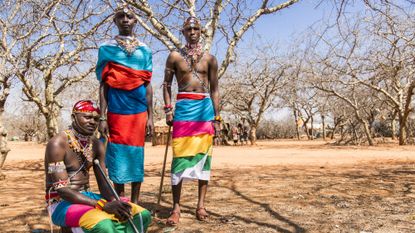
In a new positive step, it's Kenyan men that are working to stop FGM and end the stigma against 'uncut' girls in their community...
Words by Rosie Benson
Female Genital Mutilation (FGM), the practise that involves cutting off a girl's clitoris, and sewing up her vulva, is a difficult subject to discuss openly in many parts of the world. And yet encouragingly, it is young men in some of the most vulnerable communities who are leading the fight to end this barbaric practise.
Globally at least 200 million girls and women have been cut, and more than 30 million girls are at risk over the next decade – including in the UK, where it’s thought that 21 out of every 1000 women have experienced FGM.
FGM is routinely practised without anaesthetic, using dirty and rudimentary tools - even scissors. Women have bled to death after undergoing FGM, and many remain with both psychological and physical pain for the remainder of their lives, as well as facing complications in childbirth and pain during sex.
To mark the International Day of Zero Tolerance to FGM on 6th February, Marie Claire spoke to some of the young warriors in Kenya, working alongside the UK Department for International Development, about how they are combatting the practise:
Josephat, 25, a Kenyan 'moran' (warrior)
Marie Claire Newsletter
Celebrity news, beauty, fashion advice, and fascinating features, delivered straight to your inbox!
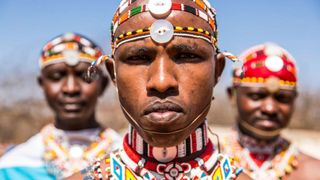
‘I’ve seen so many complications as a result of FGM. When my own sister, Bella, was cut she experienced a lot of bleeding and had to go to hospital for a week. I felt so bad watching what happened to her. She was healthy one day and then bleeding from morning to evening the next. It was so dangerous - I could see the risk. I could have lost my sister. It's important to me to take the initiative and work to abandon the practice. We have played a great role in the campaign to end FGM in our community in Kenya. We also went to another village about 40 miles away and we talked with the elders for a whole day about FGM. Some days later we met them at the market centre and one of them turned to me and said, “We discussed FGM, and we’ve said let's not practice it any more". That’s the impact – someone coming and telling you they’re going to stop – without you having to ask.'
Robert, a 25 year old moran, has made a public declaration that he will marry an uncut girl.
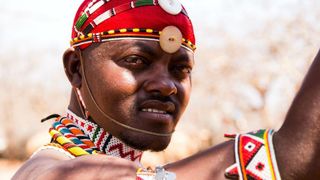
‘I know that FGM has no value – it does not change a woman in a good way. In fact, it brings a lot of complications. I have seen so many girls taken to hospital because of bleeding. I’ve seen people die. Because I am part of this community I’ve taken the initiative to stop this. If we can come together and make a social agreement as a community to abandon FGM I’ll be so happy.’
Twin sisters, Hope and Leah, 16, from south-west Kenya, told Marie Claire how they managed to escape being cut at the last moment.
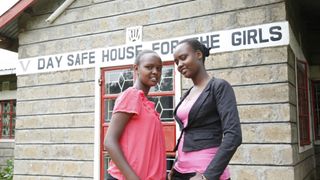
'Our parents wanted to force us to have FGM but our older sister didn't want us to be cut. I don't know who told our parents we were planning to escape - we ran away to the chiefs home the night before we were due to be circumcised, but our parents bribed the chief and he sent us back home. They tried to do it there and then but we said to our mum "let's just wait and be circumcised in the morning." We were so scared. We were due to be cut at 7:10am - it was almost 7am when we saw a police car coming for us - they took us to a safe house, where girls can be taken care of and go to school until they are able to go home. We were the first girls in our village to refuse FGM so it was a taboo. Our dad has never come to visit us, but we still love our parents - and my mother is now saying that our younger sister will not be circumcised so we're very happy.'
Despite Hope and Leah's lucky escape, the Department for International Development (DfID), who are working with communities in Kenya to stop FGM, want to see an end to the situation where girls have to escape their families in order to remain uncut.
Priti Patel, Secretary of State for International Development, said in a statement: 'FGM is an abhorrent violation of girls’ fundamental rights and it must be stamped out . We stand united behind the belief we can end FGM in a generation. I am proud that UK aid has already contributed to over 17 million individual pledges to abandon the practice but there is still much to do. We must maximise our efforts to free girls around the world so they can grow up and fulfil their true potential.'
Through the work of DfID and campaigners like Josephat and Robert, let's hope that many more communities around the world are inspired to stop FGM for good.
The leading destination for fashion, beauty, shopping and finger-on-the-pulse views on the latest issues. Marie Claire's travel content helps you delight in discovering new destinations around the globe, offering a unique – and sometimes unchartered – travel experience. From new hotel openings to the destinations tipped to take over our travel calendars, this iconic name has it covered.
-
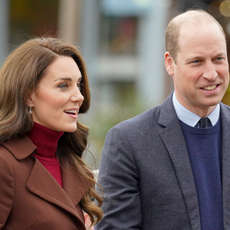 William promises to 'look after' Kate during her cancer treatment
William promises to 'look after' Kate during her cancer treatmentHe returned to work today and reassured royal fans
By Jadie Troy-Pryde
-
 Quick – the whole fashion team is adding these £36 crystal ballet flats to basket
Quick – the whole fashion team is adding these £36 crystal ballet flats to basketShining, shimmering, splendid
By Natalie Hughes
-
 Olivia Munn opens up about her medically-induced menopause following breast cancer diagnosis
Olivia Munn opens up about her medically-induced menopause following breast cancer diagnosis"I figured, as a woman, I can't escape menopause. So I'd rather just take it on now."
By Jadie Troy-Pryde